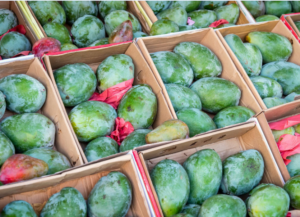
A $1 Trillion Food and Agriculture Sector in Africa Offers Limitless Possibilities for Investors, Smallholder Farmers.
Sowing for Domestic Food Security
The action plan to accelerate global business and investment in Africa, developed by the World Food Program in collaboration with the African Continental Free Trade Area (AfCFTA) cited agriculture and agro-processing as a critical sector. The action plan is designed to enhance the engagement of the private sector in actualizing the AfCFTA aspirations of a single African market with companies such as Coca-Cola and Yara international headlining initiatives in the sector. While each private player has their own goals and strategies, cumulatively, they will cement the place of the private sector in driving intra-African trade across the continent.
Agriculture is a crucial sector in Africa’s prosperity employing more than half of the working population and contributing to over 35% of the continent’s GDP. Considering this central role, the sector would be a beneficiary of the AfCFTA aspirations of growing intra-African trade, creating jobs, increasing and meeting local demand, and reducing poverty in the continent.
However, gaps still exist in the sector that limit the up-scaling of the sector, challenges that private players committed to the action plan must be willing to meet. For instance, while Africa has over 51 million farmers, 80% of them are smallholders specializing in subsistence farming on lands less than one hectare and earning an average of two dollars a day. One would therefore seek to understand where the priorities of the private sector players lie in enhancing the utilization of the World’s 60% arable land to increase the continent’s agricultural yields that only reach 25% of its full potential.
Private Sector Player Opportunities
Underlined in the action plan is the aspiration to transform the continent’s agricultural sector for Africa to achieve domestic food security and become a net food exporter by 2050. While the action plan projects Africa’s intra-trade on agricultural produce to increase by 574% by 2030, this is highly dependent on the elimination of unnecessary tariffs facilitated by the AfCFTA agreement. As currently constituted, mechanization in the continent is limited to large firms with smallholder farmers often lacking the extensive and innovative technology that affects yields and productivity. There is an 800% increase in fertilizer application required to realize the sector’s agricultural potential, a deficit of over $65 billion in irrigation investment, and an $8 billion investment in storage facilities.

Africa has shared its ambitions to develop a
“Mango Hub” to expand its regional sourcing of
inputs for fruit juice bottling.
The agriculture and agro-processing sector under the AfCFTA therefore provide numerous opportunities for the private sector players. There is an opportunity for players to add value to an already competitive agricultural sector by filling in gaps that enhance productivity and reduce both costs and waste in the medium run. Considering the diversity of the African continent, players must also be ready to leverage regional differences to develop food value chains effectively feeding Africans and laying groundwork for global exportation. Thirdly, there is room for manufacturers and innovators to invest in meeting input and infrastructure needs in the industry. Coca-Cola’s proposed mango hub in East Africa is an illustration of the promise of AfCFTA collaboration in making Africa food-sufficient and a net exporter.
Conceptualizing Private Sector Involvement
The African food and agricultural market is estimated to reach $1 trillion by 2030 further characterizing the underlying opportunities for the sector in the economy. However, meeting the demand in the industry will require private sector players to investigate the reasons for friction in the agricultural sector and develop ideas for solutions to the challenges in collaboration with nations and the AfCFTA. This is an ideal starting point to facilitate a buy-in from public sector project stakeholders to facilitate political goodwill and collaboration in dealing with underlying challenges. This ensures that stakeholders operate from a knowledge point of view for the operationalization of trade agreements in the continent while accelerating the implementation of the AfCFTA.
“The imperative of players investing in infrastructure development across the continent to add value to the supply chains, and reduce costs and delays is now more clear-cut than ever.”
Africa’s food and agricultural productivity is inhibited by deficiencies in crop nutrition around fertilizer use, soil health, and the impacts of climate change. There is room for businesses to focus on providing agronomic research to offer region and crop-specific advice that would drive a positive impact on the use of fertilizers and best practices for the sector. This is critical to making use of the world’s 60% unused arable land domiciled in Africa to enhance food productivity. Research and development investment in this regard would help farmers optimize soil health and achieve maximum possible yields in a more environmentally responsible manner to feed the continent.
A resource gap has often resulted in smallholder farmers facing significant barriers to entry and growth in the sector limiting their abilities to scale operations and productivity. Private sector players can enhance the decentralization of input manufacturing and distribution to lower existing barriers to entry. This can include enhanced access to high-quality and affordable fertilizers and crop nutrition solutions for optimal soil health and enhanced maximum crop yields. As such, there is room for players to invest in research and development for differentiated solutions in balanced nutrition concepts to counter soil acidity and the customization of solutions for specific soils, crops, and climatic conditions. Notably, however, this can be possible with better harmonization, zero or lowest possible import tariffs, and duties as envisioned under AfCFTA to integrate the few input manufacturing facilities in the continent.
The imperative of players investing in infrastructure development across the continent to add value to the supply chains, and reduce costs and delays is now more clear-cut than ever. Businesses have to consider infrastructure development in key regions while expanding their footprint to better serve farmers. The more strategic location of the storage facilities, import terminals, blending units, and manufacturing plants not only secures competitive freight rates, and better vessel discharge rates but also low inbound handling costs securing a competitive portfolio for players.
Women and youth labor share in the African agricultural sector amounts to 60-80% of the need for social impact and capacity building by the private sector to add value to existing value chains. Companies capitalizing on the AfCFTA-led action plan therefore have to consider developing initiatives for empowering farming communities, youth, and women to become better farmers and Agri-entrepreneurs. Strengthening social programs for skill development and capacity building in running micro, small, and medium-sized enterprises in the sector is a much-needed step to integrate smallholder farmers into the full food value chain.
Collaborative Impact of the AfCFTA
While the private sector has a significant investment, research, and development, it is incumbent upon the AfCFTA to actualize the creation of a single African market and the reduction of barriers to cross-border trade. Under the WEF action plan alliance, steps that include signing agreements with the right private sector partners and seeking beneficiary government commitment are necessary. Moreover, the AfCFTA secretariat will be critical in securing needed donor engagements and funding, establishment of working groups for the implementation, and the roll out of solutions.
The AfCFTA remains a crucial player in dealing with existing import tariff barriers to enhance intra-Africa trade and boost productivity and the desire of players to invest in the continent. It suffices to note that the success of the initial initiative will catalyze increased action and trickle-down effects on sub-sectors and linked industries to enhance Africa’s development and food security.
Muoki Musila is an Kenyan based economist. These are the writer’s own opinions and do not necessarily reflect the viewpoints of Liberty Sparks. Do you want to publish in this space? Contact our editors at info@libertysparks.org for further clarification.



